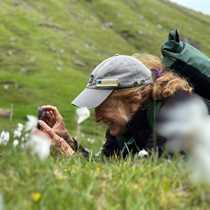Columbia River
How you view a landscape changes with the different perspectives taken. If you have heard the line that people in Oregon don’t tan, they rust, on account of the abundant costal rainfall, how do you account for the desert-like features of the steppe region east of the Cascade mountains? The contrast from west to east, a change from verdant tree covered hillsides, to a bronze landscape of undulating naked hills. A landscape so devoid of vegetation that just over 200 years ago in their journals the men of the Corps of Discovery admitted to taking wood for their dinner fires from a native village site, as opposed to trading for it, one of the two larcenous events during their 863 day expedition.
We traveled east most of the day, with a short jaunt north, and eastward once again on a series of calm, nearly still lakes. The perspective of the Corps was a river level view over the bow of a freshly burned dugout canoe, the serpentine curves of the river and its rapids and shoals made for a harried and precarious down stream voyage.
One of the most common inquires of our day was, “Who owns this land and where are they?” Quite the contrast to entries of the journals in the fall of 1805 that mentioned hundreds of natives lining the shore and dozens of lodges along the waters edge, including a burial lodge.
We found a commonality with the Corps in the salmon we enjoyed at our gastronomic gala this evening. Even with this tie, our perspectives diverge. Included with the wines and other specialty foods was an array of smoked sea foods. The Corps did not enjoy this same smoked succulence. They ate dried, pounded fish or “fresh” fish, which they held suspect as to its true freshness. The sheer numbers of salmon differ significantly as well. Today the numbers are drastically reduced, a historical remnant of what had supplied native cultures with a predictable supply of protein for sustenance and trade.
Our route on the Columbia and Snake Rivers is the same the Corps traveled in the fall of 1805, however 201 years has brought change and subsequently, different perspectives.
How you view a landscape changes with the different perspectives taken. If you have heard the line that people in Oregon don’t tan, they rust, on account of the abundant costal rainfall, how do you account for the desert-like features of the steppe region east of the Cascade mountains? The contrast from west to east, a change from verdant tree covered hillsides, to a bronze landscape of undulating naked hills. A landscape so devoid of vegetation that just over 200 years ago in their journals the men of the Corps of Discovery admitted to taking wood for their dinner fires from a native village site, as opposed to trading for it, one of the two larcenous events during their 863 day expedition.
We traveled east most of the day, with a short jaunt north, and eastward once again on a series of calm, nearly still lakes. The perspective of the Corps was a river level view over the bow of a freshly burned dugout canoe, the serpentine curves of the river and its rapids and shoals made for a harried and precarious down stream voyage.
One of the most common inquires of our day was, “Who owns this land and where are they?” Quite the contrast to entries of the journals in the fall of 1805 that mentioned hundreds of natives lining the shore and dozens of lodges along the waters edge, including a burial lodge.
We found a commonality with the Corps in the salmon we enjoyed at our gastronomic gala this evening. Even with this tie, our perspectives diverge. Included with the wines and other specialty foods was an array of smoked sea foods. The Corps did not enjoy this same smoked succulence. They ate dried, pounded fish or “fresh” fish, which they held suspect as to its true freshness. The sheer numbers of salmon differ significantly as well. Today the numbers are drastically reduced, a historical remnant of what had supplied native cultures with a predictable supply of protein for sustenance and trade.
Our route on the Columbia and Snake Rivers is the same the Corps traveled in the fall of 1805, however 201 years has brought change and subsequently, different perspectives.




